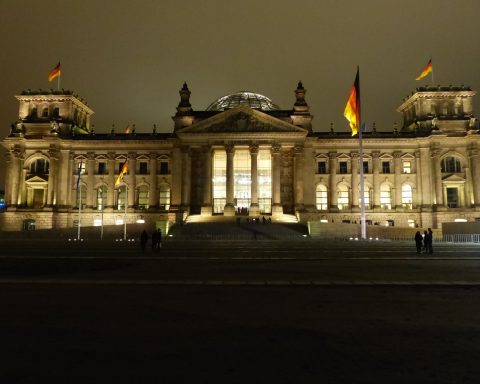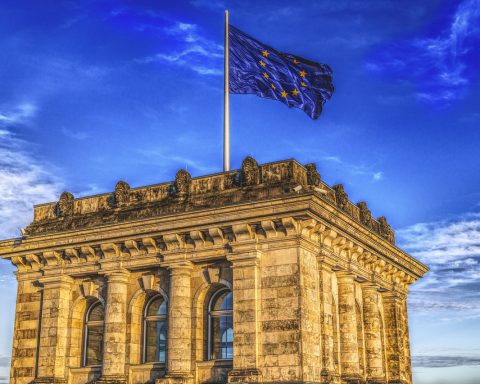On 24 September 2017, German voters shall elect a new Federal Diet and, as a consequence, a new Federal Government. How does the country’s political system work? How important are political parties in the election?
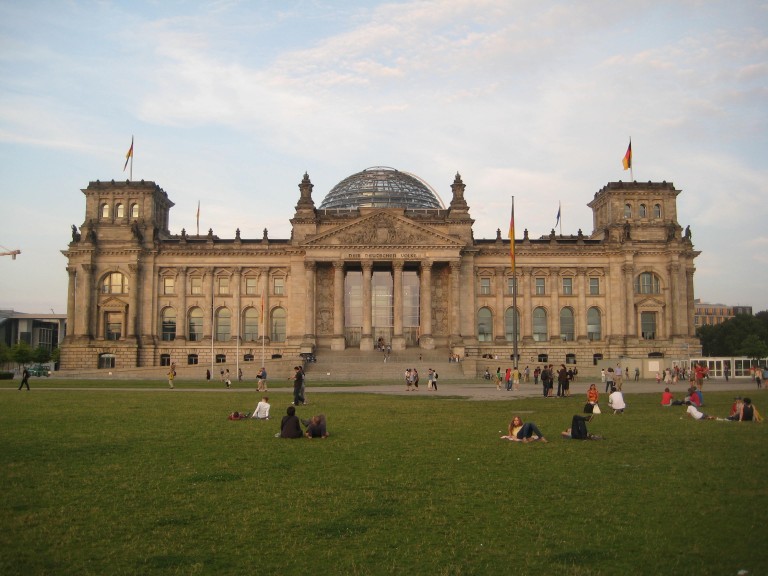
The Federal Diet (Bundestag) is one chamber of Germany’s Legislative, the other one being the Federal Council (Bundesrat). The latter represents the 16 Federal States (Bundesländer), the former the German people as a whole. The Federal Diet discusses and passes federal laws, some of which require the consent of the Federal Council to enter into force. Furthermore, the Federal Diet elects the Federal Chancellor (Bundeskanzler/in), head of the Federal Government (Bundesregierung).
In each of the currently 299 federal constituencies (Bundestagswahlkreise) in Germany – two of which are in Leipzig – a total of almost 62 million people entitled to vote shall cast two ballots each: one for an individual candidate of the electoral district, the other one for a political party. Seats in the Federal Diet are assigned, first, to candidates who have won the majority in their district and, second, to those whose party has won enough second ballots.
Thus, the voting system relies both on majorities and proportions, which is why the Parliament will have many more than just 299 members – currently, there are over 600 of them.
After the upcoming election, a new number of seats will be calculated according to the distribution of votes. Then, the new Bundestag – number 19 since the 1949 foundation of the Federal Republic of Germany – will hold office for a regular legislative period of four years.
One of the first duties of the new Parliament will be the election of the Federal Chancellor, since the tenure of the incumbent and the members of her or his government ends as soon as a new Bundestag convenes.
In the election of the German Chancellor, the political parties play a crucial role.
They do so in the German political system in general. In the election to the Bundestag, no candidate can in fact be successful without belonging to a party. Then, those who have won a seat form a parliamentary faction (Fraktion) along with all other MPs of the same party. The members of such a faction are expected by their party leaders to act, as MPs, in accordance with their party’s views and decisions – and as a rule they comply, even though the German Constitution (see Grundgesetz, Article 38/1) grants members of the Federal Diet total independence from anybody’s instructions.
Yet the only MPs who fully enjoy that right are those who have, for some reason, quit, or been excluded from, their faction and/or party and spend the rest of their term as “factionless deputy”.
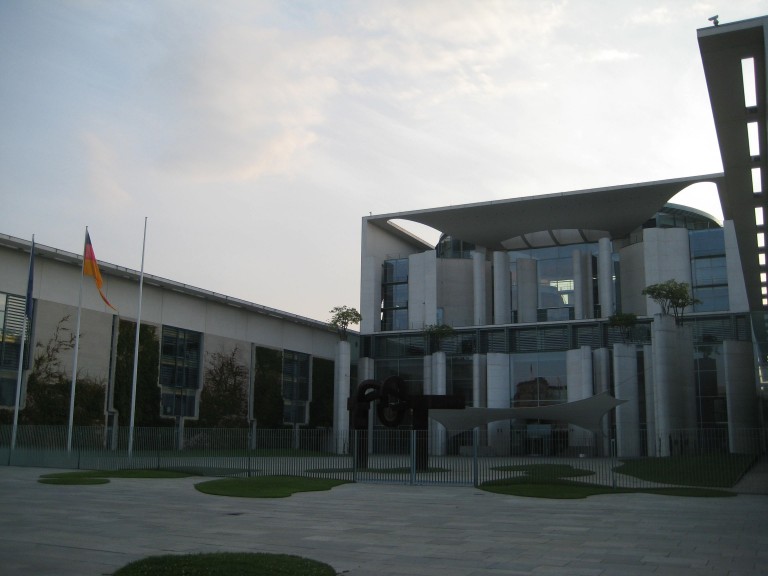
Be that as it may, even Federal Chancellors are nothing without their party, which is why they usually also chair the latter – as is the case of Angela Merkel and her CDU; her main rival Martin Schulz has in turn been elected both leading candidate and chairman of his SPD. For in fact, without support from, and control over, their party, Chancellors could not make the Bundestag pass laws their government proposes.
While Presidents of the U.S. may to some extent bypass their Parliament (Congress) through “Executive Orders”, Germany’s Federal Chancellors rather depend on parliamentary majorities to put their agendas into practice.
It follows that the parliamentary group with the most votes, and hence most seats, will determine the Chancellor. This group may consist of one single party possessing the absolute majority of seats; or, as has usually been the case, of several parties forming a coalition (Koalition) whose combined seats make up more than half of those existing.
Merkel’s current government is based on a coalition between her CDU, the Bavarian CSU and the SPD.
In addition to their offices in government and party, almost all Chancellors have simultaneously been members of the Federal Diet – since the general electorate cannot elect them Chancellor. In this regard, the German democracy is an indirect one, in contrast to France, for example, where the President is elected by the people themselves.
In Germany, it would even be possible for somebody to be elected Chancellor against the will of the Diet’s strongest party – if parties with fewer seats form a coalition whose combined seats outnumber those of the strongest single faction. This has so far happened three times, but not again since 1980. In any case, Chancellors have so far come from two parties only: five from the CDU, and three from the SPD.
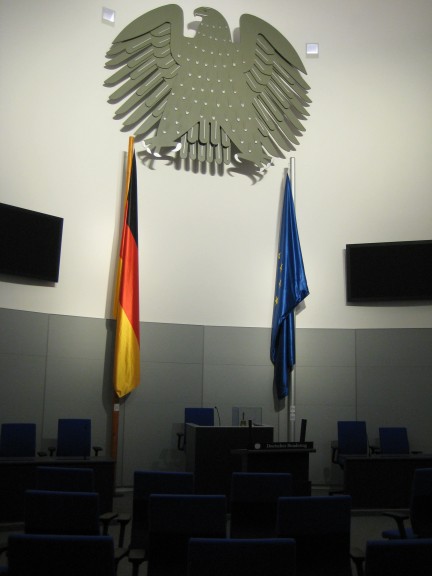
However, the fact that the leading party of the strongest coalition elects “its” Chancellor – who is announced before the election and will then choose his or her ministers from among the coalition partner(s) – weakens the separation of legislative and executive powers. For instead of controlling the executive Government, most of the legislative Federal Diet serves the contrary purposes of supporting and defending the government’s policies.
In fact, a Federal Chancellor’s most important collaborator may not be any minister, but the faction leader (Fraktionsvorsitzende/r) of his or her party in the Bundestag – who “organizes” parliamentary majorities and imposes the so-called “discipline of the faction” (Fraktionsdisziplin) on faction members with insubordinate tendencies.
As a result, only two times in its 68-year history has the Bundestag used its right to attempt the election of a new Federal Chancellor to replace the incumbent (a so-called “motion of no confidence” – Misstrauensvotum): in 1972, when the attempt failed for lack of a sufficient majority, and in 1982, when the attempt succeeded.
In sum, if I was to improve the political system of the German Federal Republic, I would reduce the power and importance of political parties and promote a discourse and decision-making based on pragmatism and reason rather than on ideology and party tactics.
Isn’t it foolish, isn’t it childish that, for example, a German Chancellor from one party will never choose a minister from another party (outside the governmental coalition), even if that person is more capable than anyone from the Chancellor’s party? In my view, political parties should serve the country and not the country the parties.
But for all that, I have no doubt that – despite its weaknesses – the German political system has performed better than most others in the world, given the country’s admirable rise in prosperity and reputation as well as its remarkable stability since 1949. Its political parties have contributed to that, by uniting people of similar opinions, structuring and elaborating political ideas, steering the country as government, or controlling it as opposition.
In another article, I will analyze the parties running for the next Bundestag.



